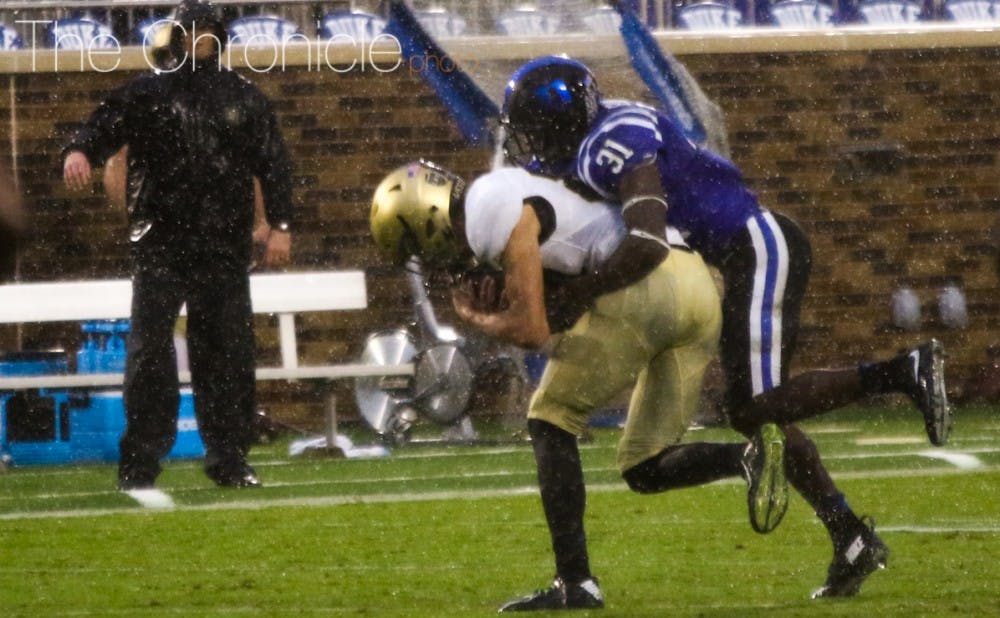Once again, another team has been victimized by the NFL’s system for calling penalties—more specifically, by its rule that does not allow instant replay to apply to pass interference.
This time it was the Atlanta Falcons, who lost after an obvious defensive pass interference call was missed on 4th-and-10.
But Sunday's example with Seattle All-Pro cornerback Richard Sherman preventing Falcons wideout Julio Jones from going up for a catch is just the latest showing why instant replay should apply to pass interference.
The problem has reared its ugly head time and time again. In 2013, a hotly contested decision to not call defensive pass interference against the Baltimore Ravens changed the outcome of the Super Bowl, but more than three years later, neither the NFL nor NCAA has made any progress in finding a solution to the problem.
To clarify, not every pass interference call or no-call is incorrect. There just needs to be someone else making sure that the on-field decision is correct before continuing the game.
The average football plays lasts about four seconds, and that small fraction of time in which the defender and receiver actually make contact is only a split second, too little time for the human eye to often accurately decipher the effect of the contact on a reception or incomplete pass. Why not just extend the instant replay system to cover pass interference?
Right now, the replay system used by the NCAA and NFL is only used for situations excluding penalties, with the exception of targeting penalties at the collegiate level. For the 2016 season, the NCAA has elected to use the NFL's system, but pass interference penalties still can't be overruled by the replay assistant, except when deciding whether the ball was previously tipped before finding the receiver in question.
The challenge system for coaches is already in place, but the challenge system is not the only form of instant replay currently being used. The other form is a booth review, in which replay assistants press a buzzer to alert the on-field officials to stop the game in order to review the most recent play, which already automatically happens for every turnover, scoring play and ambiguous play inside two minutes remaining in both halves.
Yes, adding pass interference to this long list would make the games slightly slower. But what is better—taking the extra two minutes and ensuring that the call is correct, or letting the on-field decision remain and spending an entire week defending the on-field call, which may not even be correct?
Wins and losses cannot change after the game has been decided, regardless of whether or not a penalty or lack thereof is corrected.
Take for example, the exact play in the Seahawks’ eventual 26-24 victory Sunday. The Falcons had one last chance to advance the ball to continue a potential game-winning scoring drive, and on fourth down, quarterback Matt Ryan lofted the ball up to Julio Jones, who appeared to have a chance to secure the catch.
As shown in the video at the top of this story, Sherman grabs Jones’ right arm and holds it throughout the entire catch attempt, and Jones eventually fails to make a one-handed grab. At specifically the six-second mark of the clip, Jones appears to be attempting to get his arm free from Sherman’s grasp to make the two-handed catch, but Sherman prevents that from happening.
The play falls under the NFL’s definition of defensive pass interference, but due to the referees’ on-field vantage point, Sherman’s contact may have been invisible to the officials.
The advanced booth review system would shed light on some of the ambiguity of the situation and many like it each week.
Just like they would inside of two minutes, the referees would get an alert to stop the game to subject the previous play to a booth review from the replay assistant. Then, this off-field official would have ample time to decide if the on-field referees made the correct call, and if not, he or she could alert the other referees to change the call.
Then, at least, the blame and questioning would be directed toward the replay assistant, who would have to explain their reasoning for either confirming or overturning the initial decision.
With such high stakes for both college and professional football games that may impact other teams around the league, why rely on a split-second decision of the human eye to make the call—especially when the technology exists to do otherwise?
Instant replay has come a long way in improving officiating, but Sunday was another reminder of how far it still has to go.
Get The Chronicle straight to your inbox
Signup for our weekly newsletter. Cancel at any time.

